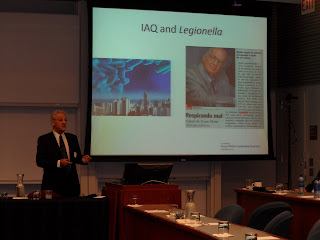Vale a pena pensar que os investimentos na prevenção sempre serão menores.
Vejam que a Legionella que tento falamos está com o custo mais elevado de todas.
Three waterborne diseases cost U.S. $539 mln a year.
WASHINGTON |
(Reuters) - Three diseases spread by drinking or inhaling contaminated water cost the U.S. healthcare system as much as $539 million a year in hospital expenses, researchers reported on Wednesday.
The three diseases -- Legionnaires' disease, cryptosporidiosis and giardiasis -- are caused by three very different microbes but what they have in common is they are spread by water, researchers told the International Conference on Emerging Infectious Diseases in Atlanta.
"These cost data highlight that water-related diseases pose not only a physical burden to the thousands of people sickened by them each year, but also a substantial burden in health care costs, including direct government payments through Medicare and Medicaid," Michael Beach of the U.S. Centers for Disease Control and Prevention, who worked on the study, said in a statement.
No one has put together good data on what all waterborne diseases cost the U.S. healthcare system.
Beach and colleagues looked at data from 2004 to 2007 from a large insurance claims database. Singling out Legionnaires' disease, cryptosporidiosis and giardiasis, they calculated the costs to the insurer, the patient, and the total amount paid.
The hospital costs per case averaged more than $34,000 for Legionnaires' disease, $9,000 for giardiasis and more than $21,000 for cryptosporidiosis, Beach told the meeting.
Legionnaires' disease is caused by Legionella bacteria, named for a 1976 outbreak at an American Legion convention in Philadelphia. It causes pneumonia and kills between 5 percent and 30 percent of patients, sending between 8,000 and 18,000 people to the hospital each year.
It can be treated with antibiotics.
Giardiasis is caused by the parasite Giardia intestinalis, found on surfaces or in soil, food, or water that has been contaminated with the feces from infected humans or animals. It causes diarrhea and there are several drugs to treat it.
Cryptosporidiosis also causes diarrhea linked to fecal contamination of water and is caused by Cryptosporidium parasites.
"When people think about these diseases, they usually think of a simple case of diarrhea, which is a nuisance but quickly goes away. However, these infections can cause severe illness that often result in hospital stays of more than a week, which can quickly drive up health care costs," Beach said.
Low-cost ways to prevent these infections include public education campaigns, appropriate maintenance of building water systems, and regular inspection of pools and other recreational water facilities, the CDC says.













